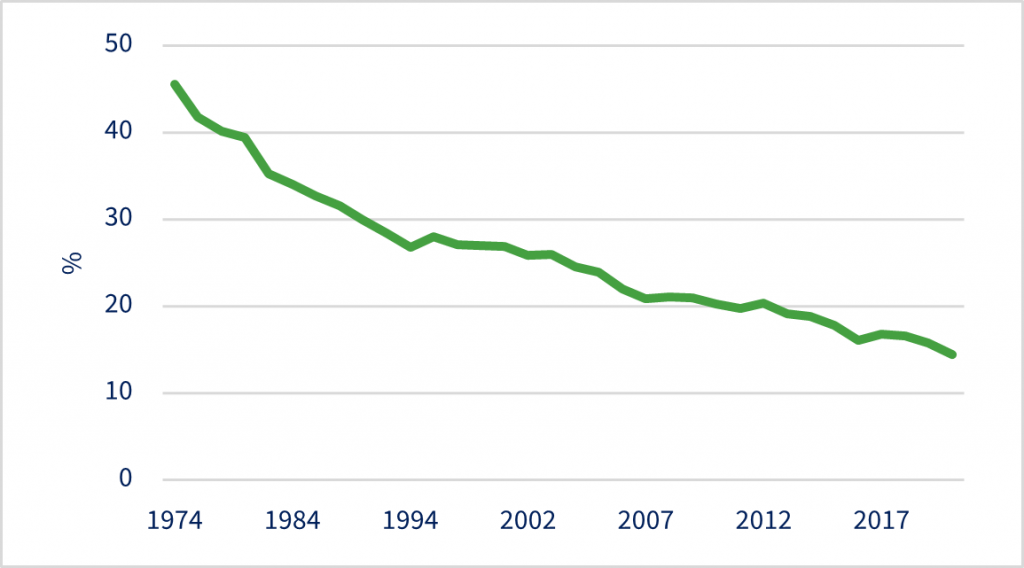


A new study involving more than a half a million people suggests that smokers can cut their risk of dying prematurely by up to 90% if they quit the habit before the age of 45.
Giving up cigarettes 10 years earlier - before the age of 35 - was shown more or less to eliminate the additional mortality risk associated with continuing to smoke.
The study of 551,338 participants was carried out in the United States between 1997 and 2019. It was published in the Journal of the American Medical Association last week.

Pictured: The 22-year study showed the dramatic benefits of giving up smoking before middle age.
"The relative benefits of quitting were consistent among men and women from diverse racial and ethnic groups, particularly among individuals who quit smoking before age 45 years," said the researchers who led the study.
"For example, former smokers who had quit before age 45 years had all-cause mortality rates approximately 10% to 20% higher than those among never smokers for each group considered compared with approximately 100% to 200% higher mortality rates among those who continued to smoke.
"Quitting smoking before age 45 years was associated with reductions of approximately 90% of the excess mortality associated with continued smoking.
"A strength of this study is its size, which allowed for reliable estimates of both the hazards of smoking and benefits of quitting by race, ethnicity and sex, including the benefits of quitting at different ages and for different durations. A further strength is that this study used data from a nationally representative survey, which should have limited selection bias and enhanced the generalizability of our findings."
Quitting smoking before age 35 associated with complete "reversal of risk" compared to people who never smokedhttps://t.co/DR21JDKZcZ pic.twitter.com/SpCEqHpp8t
— Prof Kamlesh Khunti (@kamleshkhunti) October 27, 2022
Pictured: Findings of the new study were hailed by many doctors and other experts, including Professor Kamlesh Khunti, a Professor of Primary Care Diabetes and Vascular Medicine.
Guernsey's Health Improvement Commission, which runs services which help people give up smoking, said the study seemed credible and presented important and interesting findings.
"The Journal of the American Medical Association, where the study appears, is a well-regarded, peer-reviewed medical journal. The main analyses featured 551,388 participants in the US - a large cohort - and the analyses were adjusted for a number of factors which could have confounded the relationship between smoking and mortality," said the Commission.
"From a methods perspective, this study is useful because it focuses on the health outcomes associated with quitting smoking as well as never smoking or being a current smoker. It also features a diverse range of racial or ethnic groups as well as men and women and analysed associations by these groups.
"From a findings perspective, a particularly interesting finding is that quitting smoking before the age of 45 was associated with reductions of approximately 90% of the excess mortality risk associated with continued smoking. In simple terms, quitting by middle age is hugely beneficial to people’s health."

Pictured: The study underlined that the benefits of quitting smoking are not restricted to younger people.
The study also found that "quitting [smoking] at ages 45 to 64 was associated with reductions of approximately 66% of excess risk".
The Commission said this underlined that giving up smoking has substantial health benefits at any age.
"Those of us who smoke can see that giving up really has a positive impact on overall heath," it said.
"If you are a smoker, then quitting at a younger age gives the largest gains, but rather than worrying if it is too late to quit it is clear that there are major health gains from quitting even when older."

Pictured: This graph shows how the rate of smoking in Britain has declined significantly since the early 1970s.
As well as working to encourage and assist smokers to quit, the Commission hopes to prevent young people from taking up the habit.
"It remains the case that preventing people from starting to smoke is by far the most effective way to prevent the health harms of smoking," it said.
"Like others before it, this study also showed that most people start smoking before the age of 18, so a multi-faceted approach to stopping children and young people starting is still critical.
"However, the study justifies continued efforts to support people to quit smoking. Locally, support is available via Quit Line. In addition, this year, in partnership with Quit Line and Public Health, we invested in a new, free digital way to quit called Quit Genius. We’re seeing early positive results, as people in the Bailiwick are signing up to take part.
"Quit Genius is free to those living in the Bailiwick and is a mobile app and personal quit coach that provides behavioural support to help people quit. It is a brilliant option for people who have busy lives and want to fit quitting smoking around them."
More information about the Commission's tobacco support services can be found by clicking HERE.
Comments
Comments on this story express the views of the commentator only, not Bailiwick Publishing. We are unable to guarantee the accuracy of any of those comments.